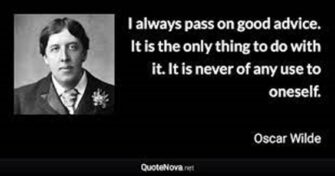Oscar Wilde on Fundraising Copy
“Books are well written or badly written. That is all.” Well, whatever aesthetic criteria Oscar had in mind when talking about literature, we can now scientifically say the same for fundraising copy.
All I’ve ever done is write copy (I mean, I’ve done other stuff with my life, but not for a living). But it’s only in the past year, since testing and launching the Copy Optimizer, I’ve had any objective criteria by which to assess whether anything I wrote was good or bad.
In the fundraising world good or bad is defined by response rate. But despite endless drafts and rounds of sign off via committee, no was ever able to say whether copy would perform well.
Of course, that didn’t stop the gurus from preaching. In ‘The Critic as Artist’ Oscar Wilde wrote “Nothing that is worth knowing can be taught.” In the case of fundraising copy, it’d be more accurate to say what we’ve been taught is worth nothing.
We’ve been fed a diet of over-simplification (e.g., “make it personal”) and at best half-truths (e.g., “say you a lot”).
What makes the Copy Optimizer a game changer is it brings together all that’s known about how humans read and process information. And it applies it to your copy. In simple terms it does for your response rate what spellcheck does for your spelling.
When you put your copy through the tool you get scores which tell you, empirically, what chance your copy has of a good response rate.
As an important aside this tool is not meant as a substitute for insight. In other words, if you write a perfectly scoring appeal about cats and send it to dog lovers, don’t blame me!
In the example shown you can see the copy has an overall engagement score of 47 out of a possible 100. Engagement is broken down into two parts. First, Readability; does this read like we speak? No (we’re at 49/100). Second, Story; have we told it well? Again, no (we’re at 46/100).
Fixing this is easy. You click on one of the three boxes (bottom right of the image) and receive clear cut directions. Here you see guidance on words to add to improve Readability.

Much of the direction you’ll get may well go against your experience. But as Oscar wrote, “

Experience is the name one gives to their mistakes.”
Charlie



I can’t enlarge the sample to be able to read it at all. Can you make it click through to a web page?
Thanks Paula, I’ll try to track down the original and post something more readable.
Thanks Paula – sorry, that was just a screenshot from my own account. You’ll get better visuals and more details at http://www.copyoptimizer.net
Charlie….This morning I received this message re your post from our friend Tom Ahern. In addition to his comment Tom also thinks we should have labeled the post an ‘advertisment.’
Tom’s Comment follows. Your thoughts Charlie?
“In response to Charlie Hulme’s post today on The Agitator, I wrote the following as a comment:
“We’ve been fed a diet of over-simplification (e.g., ‘make it personal’) and at best half-truths (e.g., ‘say you a lot’).”-[from Charlie’s post.]
[From Tom] “Charlie: I know you’re selling. And I know you’re superbly trained (reputation precedes you). But a “diet of over-simplification” can sound to less superbly trained ears as if those 2 particular recommendations don’t much matter … when in fact they matter A LOT to charities that don’t practice them, in terms of achieving fundraising’s prime directive: more money for mission.
“Sure, they’re just a couple of details in a list that stretches to dozens. But dismissing them? Is that helpful?”
Thanks Roger and Tom,
I wouldn’t dismiss either. I’d just call them out as insufficient.
The example referred to as an oversimplification was “make it personal”. Well, it sounds great. No one would get a job, much less a speaker gig preaching the opposite. But it falls apart when it meets reality; it’s almost certain that we don’t know anything personal about the person or people we’re writing to (spoiler alert – knowing they gave is descriptive info; it tells me what they did. But it isn’t predictive as it can’t tell me why).
The example referred to as a half-truth was to say “you” a lot. To be clear, pronouns matter. So, while “you” is one, it’s exactly that; one. And it’s by no means the most powerful.
[…] Source link […]